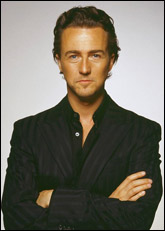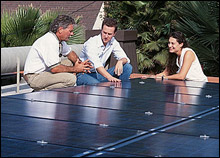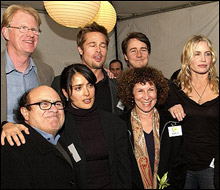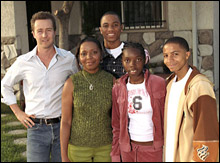
Edward Norton.
Photo: WGBH.
The world has known Edward Norton as a neo-Nazi skinhead, a lusty priest, a warbling romantic, Larry Flynt’s attorney, and Nelson Rockefeller. There is also a far less publicized role that Norton plays every day: a dyed-in-the-wool eco-devotee on the front lines of the renewable-energy movement.
In 2003, Norton teamed up with oil giant and leading solar-panel producer BP to develop the Solar Neighbors Program, which aims to get photovoltaic (PV) panels onto low-income homes in Los Angeles. Norton has brought star power to the cause with support from show-biz buddies including Brad Pitt, Salma Hayek, and Danny DeVito, and within the first year of the program succeeded in getting resources for dozens of solar installations for inner-city families.
Norton is now starring in his first eco-themed media project as narrator of Strange Days on Planet Earth, a four-part National Geographic documentary series chronicling scary environmental phenomena occurring on a global scale, the final episode of which airs tonight on PBS. Norton spoke with Grist from his hotel in Prague, where he is on location shooting The Illusionist, to discuss his impressive environmental pedigree, his indignation over Bush administration policies, his heroes, and his vices.
What was interesting to you about the way Strange Days on Planet Earth approaches environmental issues?
I was impressed with the theme that the globe is a truly integrated biological and ecological system. There’s that old adage that when a butterfly beats its wings in China, it can cause a hurricane in Africa. The film explores that concept to the nth degree, showing how science is demonstrating more and more specifically just how intimately connected to each other we are. It amazes me that we got our first images of the earth from space just over 35 years ago, and still for the most part don’t have a sense of the planet as a unified whole.

Norton (center) learning about the BP solar system on his roof.
Photo courtesy of BP Solar Neighbors Program.
Tell us about the solar project you put together with BP to help get PV installations on low-income homes in Los Angeles.
My brother and I were looking into solar applications for my house in Los Angeles and were stunned to find that the subsidies available through the state and the city were substantial enough that it made good financial sense and was a way of saving money over time. I work with Enterprise Foundation, the largest nonprofit developer of affordable housing in the country, which my grandfather founded in the late ’70s, and realized that the people who could benefit from this technology the most are the people who can afford it the least.
So you convinced BP to donate solar to affordable housing developments?
I set a goal of trying to get a substantial number of solar panels onto low-income families’ homes in a concentrated area of L.A. Then I went to BP and proposed that if we could round up celebrities and public figures to buy BP solar systems for their homes, the company would then donate a matching system for each purchase to a low-income family. They were really responsive to the idea, and we created a program called Solar Neighbors. What we’re hoping to do is have a condensed data pool to trace economic and environmental benefits for the families.
Historically the city has built power plants to satisfy peak demand in low-income neighborhoods. We’re trying to show that if you can lower demand on the grid, you reduce the likelihood of these peaker plants turning on, which are incredibly noisy and polluting.
What is the timetable for the project, and whom have you gotten on board?

A Solar Neighbors celebration: (from left) Ed Begley Jr., Danny DeVito, Salma Hayek, Brad Pitt, Edward Norton, Rhea Pearlman, and Daryl Hannah.
Photo courtesy of BP Solar Neighbors Program.
We had our first-year celebration back in November. My colleagues and friends who had participated in the program — Danny DeVito, Rhea Pearlman, Brad Pitt, Salma Hayek, Daryl Hannah, Alicia Silverstone — came down and met with the families that have gotten systems. We got about 25 systems on families’ homes in the first year, which allowed us to qualify for a $500,000 grant that will supply 40 or 50 new installations. And more people are getting involved. Bruce Willis called and wants to put an installation on his house in the Caribbean. Larry King agreed to do it. We’re trying to go beyond Hollywood to bring in broadcasters, politicians, sports figures, and musicians. I’m hoping for a snowball effect.
I understand that your dad is director of a Nature Conservancy project in China, and both of your siblings are involved in environmental work.
My father has been in China for five years directing the Nature Conservancy’s Yunnan Great Rivers conservation project. Growing up, he was a big outdoor enthusiast, and head of public policy for The Wilderness Society in the ’80s fighting all of those battles against James Watt. He engaged me and my siblings in environmental policy from a very early age. My sister got her graduate degree at the Monterey Institute of International Studies in environmental policy. My brother is a professional guide and has run whitewater trips through the Grand Canyon and elsewhere many, many times. He’s on the board of Idaho Rivers United and working very hard on the salmon-recovery issue up in Idaho. So we’re all involved in different aspects of these issues.
What are your thoughts about the Bush administration?
This administration comes as close to criminal as any in history on issues of energy and the environment. Their agenda adds up to complete sellout of American public interest to corporate profit. It is to the shame of this administration that amidst all that’s going on in the country and in the world right now, no one is saying that conservation and alternative energy need to be as seriously and aggressively explored as drilling in the North Slope of Alaska.
It confounds me to see them put forth completely bankrupt policies, even as Republican national-security analysts are stepping forward and saying energy conservation has got to be a part of our national security plan. Even as a fellow Republican, Arnold Schwarzenegger, is proposing the most aggressive solar development and incentive program in the history of the United States. Even as the United States is getting its ass kicked by the Japanese and the Germans, who are beginning to dominate clean-technology industries. Even as billions of dollars and many thousands of lives are being spent to fight oil regimes in the Middle East. It’s truly a national tragedy.
Based on interviews I’ve read, you seem to be generally upbeat about the progress of the environmental movement. Are you optimistic even in the face of the political barriers the movement is facing?
I think the environmental community is fighting a rearguard action to try to prevent irrevocable damage from occurring. Some fights are being lost, but I think more than people realize are being won. We can’t overlook the fact that some of the worst efforts are being thwarted. And we can’t underestimate the optimism inherent in the technological solutions on the rise — technology is becoming a powerful ally.
Even though it’s a very grim time in this country, I do think the consciousness on the pressing importance of these issues is rapidly expanding to all corners of the globe. Like any missionary movement, it’s one that has a lot of young adherents.
Does it concern you that the environmental movement appeals primarily to a narrow, white bourgeois constituency?
Yes, but it’s a terrible mistake to assume that people in inner-city or poor communities don’t or can’t engage in these issues. I’ve seen so many examples of the people we work with in South Central L.A. who have gotten more excited about the environmental benefits of the program than the utility-bill savings.

Norton (left) made it possible for the Andrews family to get a home solar system.
Photo courtesy of BP Solar Neighbors Program.
What role can Hollywood play in advancing the cause?
There are ways that the culture of celebrity gets used in America that are really unappealing, but it can also be an opportunity for substantive public leadership. While the environmental organizations are fending off assault on the day-to-day legislative level, it’s an important time for us to engage in the more public battle to win hearts and minds on this issue.
Are you going to go for an adventure with Cameron Diaz on her eco-themed MTV show Trippin’?
(Laughter.) I haven’t been invited, but it sounds fun. Who wouldn’t want to go on an adventure with Cameron Diaz?
Trippin’ brings together all manner of unlikely environmentalists — hip-hop artists, Latino actors, skate kids, country rockers — and seems to be a good example of an effort to reshape the white, geeky enviro identity and help get the green message to a more diverse audience.
Yes, I’ve been really trying to get people like Magic Johnson involved in our solar program because he’s been such a force in the revitalization of L.A. low-income communities. Someone like Magic can do more to raise the profile of an effort like we’re doing in those communities than I could after years of effort. You need people with real credibility in their own communities.
You’ve done politically themed movies — The People vs. Larry Flynt, American History X. Do you have any ideas for, or interest in, doing eco-themed feature films?
Well, there’s the famous Edward Abbey book The Monkey Wrench Gang that I know has been kicked around, about some guys who make a plan to blow up the Glen Canyon Dam and release the Colorado River. But I don’t think you can construct a good story from just an angle or an issue; you need it to touch on classic themes as well. Erin Brockovich, for instance, was as much a David-and-Goliath corporate-litigation story as it was an environmental story.
That said, my company produces movies for Universal and we picked up a book called Buffalo for the Broken Heart, which is a chronicle of a South Dakota cow rancher’s efforts to transform his Great Plains ranch into a buffalo ranch and bring it back to life, which has a very strong environmental component.
What steps have you taken personally to lessen your environmental footprint?
In addition to solar, I think the car we drive is the most fundamental choice in American life. I live in New York, so I don’t actually own a car, but when I’m traveling or in L.A. I use car agencies that rent hybrids. I’m renovating a little extension on my home in New York and have been exploring what’s available in terms of recycled and reused materials. My brother is hounding me to try to make my garden around my house in L.A. less water-intensive. It’s completely absurd that we have the Colorado River getting pumped into our lawns in Los Angeles for no good reason really, so my next step is to try a more native-species or dry-climate garden. It’s also important to me to financially support organizations like The Nature Conservancy, the Grand Canyon Trust, Earthjustice, The Wilderness Society, the American Museum of Natural History.
What are your vices?
Well, I fly a lot, and I wouldn’t be surprised if one trip on a jet plane from New York to London is the pollution equivalent of driving five SUVs hard for a year, so that doesn’t put me in very good standing. But I haven’t figured out how to tackle that one yet.
Who are your environmental heroes?
The people who don’t usually get acknowledged, but are doing incredible work day-to-day to hold the ground against forces of greed. NRDC [Natural Resources Defense Council], Global Green, Grand Canyon Trust, regional groups like that. One of my best friends from college is a lawyer for Earthjustice, so I’m aware of the kind of dedication it takes to make that your life’s work. All those people are fighting very heroic battles. It’s not people like me who are doing the heavy lifting.

